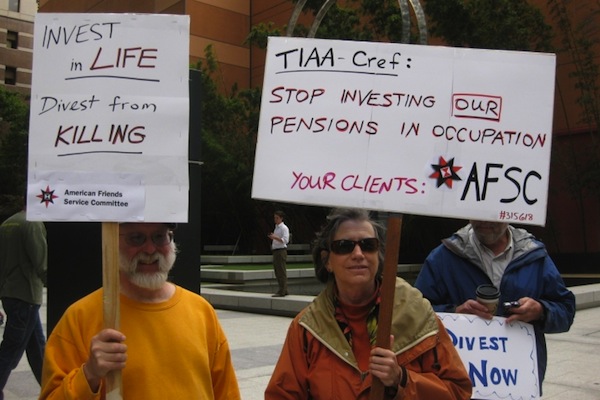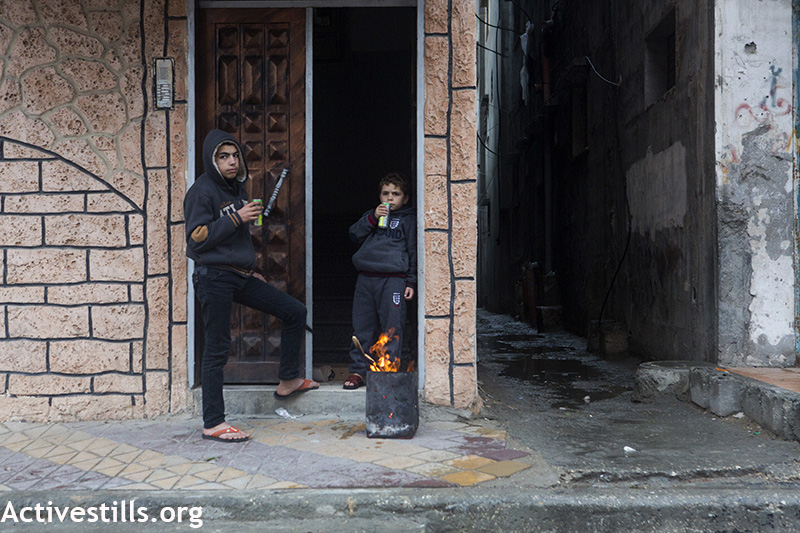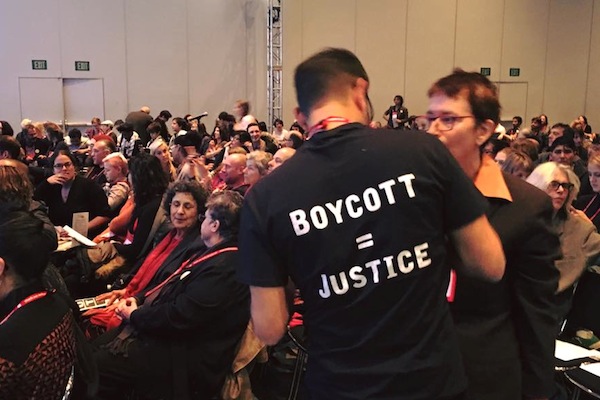The American Friends Service Committee once saved thousands of Jews from the Holocaust, now we are being banned from entering Israel due to our support for a nonviolent struggle for equality.
By Brant Rosen

Israel revealed this week a list of 20 groups from around the world it was banning from the country, due to their support for the Boycott, Divestment and Sanctions (BDS) movement. For me, the list represented more than just another news item. As staff person for one organization included on the list – the American Friends Service Committee (AFSC), a Quaker group dedicated to peace and social justice – this news hit home personally as well as professionally.
As a rabbi who works for AFSC, I am proud of the important historical connections between the Jewish community and our organization. As the U.S. Holocaust Memorial Museum itself has noted, the AFSC was at the forefront of efforts to help and rescue Jewish refugees after 1938, “assisting individuals and families in need… helping people flee Nazi Europe, communicate with loved ones, and adjust to life in the United States.”
The museum has also acknowledged that “the AFSC helped thousands of people in the United States transfer small amounts of money to loved ones in French concentration camps (and helped) hundreds of children, including Jewish refugees and the children of Spanish Republicans, come to the United States under the care of the US Committee for the Care of European Children in 1941–42.”
AFSC became involved with a different group of refugees, the Palestinians, several years later. At the end of 1948, while military hostilities in Palestine were still raging, the UN asked the AFSC to help spearhead the relief effort in Gaza, which was rapidly filling up with Palestinian refugees. Historian Nancy Gallagher has noted refugee relief was not the ultimate goal of their work in Gaza – rather, they “had accepted the invitation to participate in the relief effort with the expectation of assisting in the repatriation and reconciliation process.”

In March 1949, AFSC Executive Secretary Clarence Pickett offered a six-point plan to solve the refugee problem, urging “a substantial repatriation of Arabs into the State of Israel.” However, when it became clear that there was no international will for a political solution to the Palestinian refugee problem, AFSC formally stated that it wished to withdraw from Gaza, stating that “prolonged direct relief…militates against a swift political settlement of the problem.”
I have long been dismayed at the hypocrisy of those who applaud the Quakers’ work on behalf of Jewish refugees, yet bitterly criticize them for applying the very same values and efforts on behalf of Palestinian refugees. In a recent article for Tablet, for instance, Asaf Romirowsky and Alexander Joffe, made the spurious accusation that the AFSC “as gone from saving Jews to vilifying them,” claiming that AFSC’s experience in Gaza convinced them to “get out of the relief business altogether” so as to not promote “progressive Israel-hatred.”
In light of such invective, it is not surprising to learn that Romirowsky and Jaffe are both professionally connected to the Middle East Forum – a notoriously Islamophobic radical right organization led by Daniel Pipes that has been categorized as a hate group by the Southern Poverty Law Center. Beyond the nasty rhetoric, it bears noting that AFSC has never been solely a relief organization. From its inception 100 years ago in the wake of World War I, it has consistently promoted reconciliation and repatriation alongside direct service to peacefully address conflicts around the world. AFSC’s work in Gaza was and remains no exception.

Romirowsky and Jaffe further reveal their prejudiced agenda when they suggest that Palestinian refugees only wanted “to be maintained at someone else’s expense until Israel disappeared.” In fact, the AFSC’s refugee in Gaza took place while Palestinians were actively being driven from their homes and were being housed in hastily constructed refugee camps. It is patently outrageous to suggest that they were motivated by anything other than their desire to return to their homes. Under such circumstances, it was not at all unreasonable for the AFSC to advocate for their return and repatriation.
In their article, Romirowsky and Jaffe also parrot the Israeli government’s accusation that the BDS movement is “opposed to Israel’s existence.” What they refer to as “the BDS movement” is, in fact, a response to a call issued by a wide coalition of Palestinian unions, political parties, refugee networks, women’s organizations and other Palestinian civil society groups. The BDS call, issued in 2005, is a crie de cour from Palestinians to the world to use this time honored nonviolent strategy to pressure Israel to meet three essential demands: end the occupation of the West Bank and Gaza and dismantle the separation wall; recognize the fundamental rights of Palestinian citizens of Israel to full equality; and respect, protect and promote the rights of Palestinian refugees to return to their homes as stipulated in UN Resolution 194.
Although BDS is an inherently nonviolent tactic, it is striking to note the lengths to which the government of Israel has devoted time, energy and resources in trying to defeat it over the past decade. It has spent literally hundreds of millions of dollars to this effort, enlisted a myriad of Israel advocacy organizations and has even created a new government ministry devoted exclusively to fighting BDS. And though demands of the BDS call are based in human rights and international law, it is routinely referred to as anti-Semitic “economic terrorism” that “delegitimizes the state of Israel.” The blacklist of organizations is thus only the latest in a long line of draconian, non-democratic responses to this rapidly growing non-violent resistance movement.

As such, AFSC’s support of BDS is fully in keeping with its 100-year-old mission. We believe that all people, including Palestinians, have a right to live in safety and peace and have their human rights respected. For 51 years, Israel has denied Palestinians in the occupied territories their fundamental human rights, in defiance of international law. While Israeli Jews enjoy full civil and political rights, prosperity, and relative security, Palestinians under Israeli control enjoy few or none of those rights or privileges.
Moreover, we believe that the BDS call aims at changing this situation, asking the international community to use proven nonviolent social change tactics until equality, freedom from occupation, and recognition of refugees’ right to return are realized. AFSC’s Principles for a Just and Lasting Peace in Palestine and Israel affirm each of these rights. Thus, we have joined others around the world in responding to the Palestinian-led BDS call. As Palestinians seek to realize their rights and end Israeli oppression. After all, what are the alternatives left to them if we deny them such options?
This past October I traveled with other AFSC staff people to East Jerusalem, the West Bank and Gaza, for meetings with our staff there. Yes, our efforts in Israel-Palestine still continue. While we do not yet know whether the government’s decision will impact our work, we are well aware that hundreds of thousands of Palestinians have been denied entry into the land of their ancestors for decades. The AFSC, like the other organizations on Israel’s odious list, knows that peace can only come to this land when the essential injustice that occurred 70 years ago is justly addressed, and the human rights of all are recognized and respected.
Brant Rosen is the Midwest Regional Director of the American Friends Service Committee and the rabbi of the congregation Tzedek Chicago.
